People complain about the oddest things, sometimes; apparently including too many women authors in a given article is an affront to those who prefer a more macho approach to SF. Never let it be said that I don’t respond to criticism! To help reassure that type of reader, here are five ineluctably masculine works by the Dean of SF1, Robert A. Heinlein.
“Delilah and the Space Rigger” (1949)
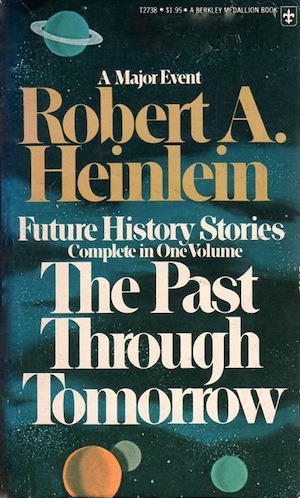
Twenty-two thousand three hundred miles above the Earth, Space Station One is the very first geosynchronous space station. One might expect technical challenges to be the main concern—in fact, it’s staff who are the worse headaches for project head “Tiny” Lawson. Staff like G. Brooks McNye. Hired on the strength of impressive credentials, McNye reveals on arrival at the station that she has the shocking habit of being a woman.
Tiny immediately sees the best use for McNye: dispatched back to Earth on the grounds that she is a woman. The other workers don’t see it that way; she has already proved herself as an engineer. They threaten to resign en masse unless McNye stays. Tiny gives in.
One of Tiny’s concerns is that having a single woman in a crew of several hundred men could be distracting.2 It’s interesting that his preferred solution is to get rid of the woman, not seek out and hire a whole bunch more.3 The usual response to this suggestion is to claim that women aren’t as good as men. Which McNye proves wrong.4
The Star Beast (1954)
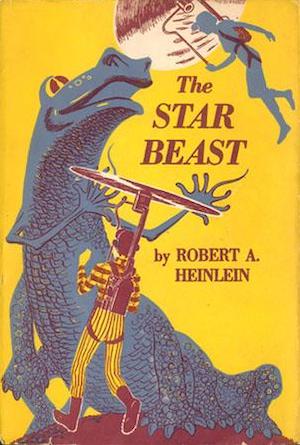
Legacies can be troublesome. In the case of high-schooler John Thomas Stuart XI, his legacy includes Lummox, an alien of unclear origin brought to Earth by John Thomas’ star-faring great-grandfather. Once small, cute, and adorable, Lummox has grown into a poorly disciplined metal-eating behemoth. Neighbors are not only complaining. They’re doing their best to have Lummox destroyed.
John Thomas is determined to save his pet, but can’t come up with a viable strategy. Luckily for the boy, Lummox is effectively invulnerable. Even better, emancipated teen Betty Sorenson is smitten with John Thomas. Betty is more cunning than her somewhat hapless boyfriend. When opportunity beckons, Betty does not hesitate to grab on with both hands. This is providential not merely for the boy, the girl, and the alien, but for the Earth as a whole, whose fate turns out to depend on saving Lummox.
If there’s a moral to this story, it’s probably “double-check the provenance of any alien babies you want to kidnap because its parents may be able to reduce the Earth to a cinder.” Powerful aliens are not that rare in Heinlein so any Heinlein character who doesn’t check for them is careless. What does stand out is that the plot depends on the insight of a sympathetic bureaucrat named Mr. Kiku. One does not see many characters of that sort in SF.
“The Menace from Earth” (1957)
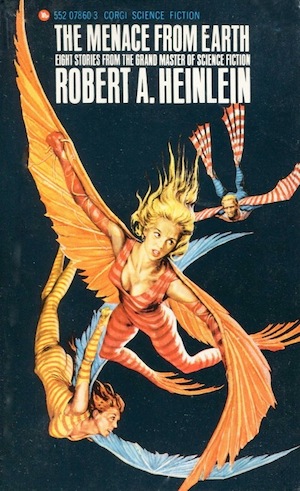
Holly Jones is an aspiring spaceship engineer. “Jones & Hardesty, Spaceship Engineers” will have to wait until Holly graduates university. Still sixteen, she has to settle for playing tour guide to rich people from Earth. The Moon offers unearthly delights, but also exciting new ways to die. Diligence is required.
Miss Brentwood may doom Jones & Hardesty, Spaceship Engineers before it is even founded. To Holly’s alarm, eighteen-year-old Jeff Hardesty—the “Hardesty” in Jones & Hardesty—seems alarmingly distracted by the older, quite fashionable Earth woman. Engineering history and other stuff is at stake, in a contest whose parameters Holly finds difficult to define.
People who have read ahead in Heinlein’s Future History know there’s bad news and good news for Holly. The bad news is Holly and Jeff won’t build and crew the starships of which Holly dreams. There is a lengthy hiatus in space travel coming soon and the first starships won’t appear until the couple is old or dead. The good news is that this means Holly and Jeff won’t end up on either Vanguard (which devolves after launch into a community of fanatical mutant cannibals) or New Frontiers (which gets hijacked by feisty octogenarians).
Podkayne of Mars (1963)
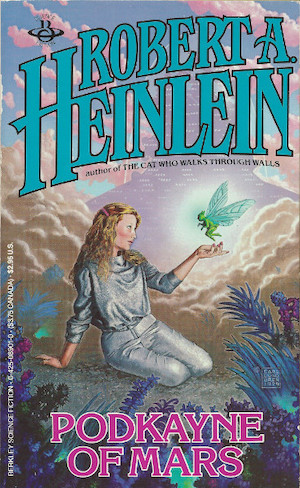
When the inadvertent decanting of her frozen siblings threatens Podkayne and her brother Clark’s space holiday, their uncle Tom steps in to save the day. Tom will play chaperone to Podkayne and Clark, allowing the siblings to tour Venus and Earth as planned, while Mom and Dad stay home with their unscheduled triplets. Everyone wins!
There is just one catch. Uncle Tom is Senator Tom Fries. For Senator Fries’ enemies, the trip is a prime opportunity to blackmail or murder the Senator. The Senator’s niece and nephew would make ideal bargaining chips, if they don’t become collateral damage.
It’s possible that Podkayne does not always make the best decisions in this book. However, brother Clark is a budding sociopath who considers smuggling atomic bombs and the occasional homicide to be acceptable behavior. Uncle Tom is the sort of person who, not having kids of his own, uses his niece and nephew as meat-shields then lectures their mother for her failures as a mother. Podkayne does not come close to making the worst decisions in this novel. It’s all relative, and her relatives are terrible.
Friday (1982)
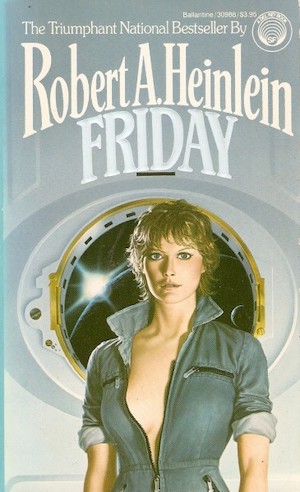
Friday is an artificial person, designed and created to serve. “Kettle Belly” Baldwin seems happy to let Friday thinks she’s his free agent but her duties expose Friday to horrific abuse and personal risk. Friday is a valuable asset for Baldwin but it seems clear that whatever Baldwin might say about his feelings towards Friday, she’s an expendable asset.
What begins as a mission gone wrong quickly develops into a continental-scale conflict. This is no doubt terrible news for all the people who cannot flee what amounts to war. Friday loses everything but in the process, finds she might be able to escape from Earth…if the employers offering her a ticket off-world don’t simply dispose of the Artificial Person once her usefulness is over.
There are a number of schools of thought about Friday as a protagonist and about the ending of the novel. I lean towards seeing her as someone who has been so beaten down by events and even by the people ostensibly on her side that she can’t imagine a happy ending5 or tell ally from exploiter.
***
I hope this satisfies the concerns of anyone worried that men don’t get nearly enough attention in science fiction. If not, I am sure there are many more Heinlein stories along the lines of the ones above. Indeed, I suspect commenters will name them in comments, which are, as ever, below.
In the words of fanfiction author Musty181, four-time Hugo finalist, prolific book reviewer, and perennial Darwin Award nominee James Davis Nicoll “looks like a default mii with glasses.” His work has appeared in Interzone, Publishers Weekly and Romantic Times as well as on his own websites, James Nicoll Reviews (where he is assisted by editor Karen Lofstrom and web person Adrienne L. Travis) and the 2021 and 2022 Aurora Award finalist Young People Read Old SFF (where he is assisted by web person Adrienne L. Travis). His Patreon can be found here.
[1]If there’s only room for one Dean, bad news for Ing, Foster, and McLaughlin.
[2]Strangely, project head Tiny is not concerned about how distracting all those men must be for the gay and bisexual men on staff.
[3]The existence of women in the work force or rather the disinclination of certain parties to acknowledge it is a plot point in H. Beam Piper’s The Cosmic Computer (Piper was Heinlein’s contemporary). Piper notes: “If you expect to get any kind of a gang together, at least a third of them will be girls. A lot of technicians are girls, and when work gets slack, they're always the first ones to get shoved out of jobs. I'll bet there are a thousand girl technicians out of work here—any line of work you want to name.” If you’re looking for a thrilling adventure, you can hardly go wrong with H. Beam Piper, whose works are so action-filled I assume that the H stood for “he-man.”
[4]While it’s clear that McNye is very good, the same cannot be said of the fellows Tiny hired before her, the ones whose firing necessitated new hires. In short, they sound like a collection of Sergeant Bilkos and Torpedoman’s Mate Lester Grubers (https://en.wikipedia.org/wiki/McHale%27s_Navy).
[5]There is a rather sad subplot in which Friday and a fellow AP fail to connect despite mutual attraction because both of them are convinced that as APs they are essentially unlovable. It is a reverse “Gift of the Magi.”










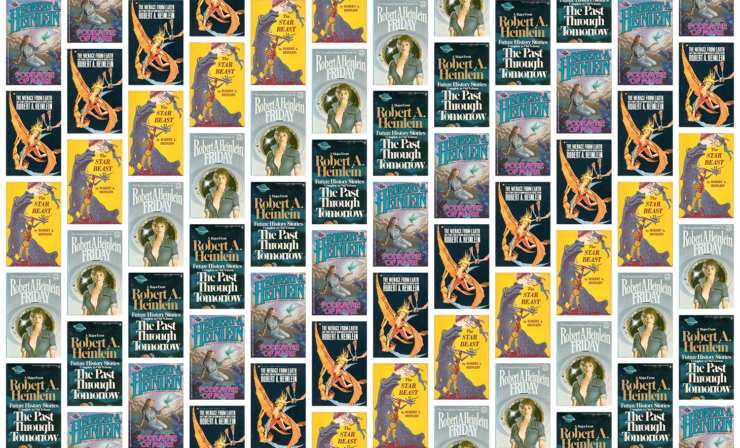
Friday and The Star Beast: two of my favorite Heinlein books.
I don’t think many SF authors have written leads who liked John Thomas as much as Betty.
SF loves its dangerous transportation technology but the backpack helicopters from The Star Beast seem extraordinarily unsafe, even for SF. What happens if someone wearing one absent mindedly turns it on while in the midst of a crowd?
@3 But the backpack helicopters were in Batman (as whirlybats)! If they’re in Batman, they *must* be safe!
Or evidence that the idea was in the air.
Star Beast is usually relegated to the middle of the pack when the juveniles are discussed, but it’s equally as sophisticated as Citizen of the Galaxy, which I would rate just slightly higher. A “secondary” character, a girl who has divorced her parents, is more competent than the lead, government and law enforcement are generally depicted in a negative way, and Henry Gladstone Kiku is one of the best characters Heinlein ever created. Too bad he never recurred in another story, or at least I don’t think he did.
I agree with your assessment of Friday. She had had it ground into her from the beginning that she had no value beyond what her employment required. The reaction to her rape is usually sited as misogynistic nonsense, but again, she was talking about what she was required to endure in her line of work, not generally as a woman, since she didn’t think she had value as a woman. She found it easier to align herself with her abuser than anyone else.
@2: golf clap
Then there’s Waldo, a misanthrope unhappily practicing engineering who finds himself much happier as a ballet dancer.
“Slipstick” Libby needs more attention, mainly because of her later appearances.
See also Sister Magdalene in “If This Goes On–“
Citizen of the Galaxy has a notable scene in which Thorby, having prevailed thanks to Leda’s guile, concludes
This foreshadows a grim future for his company, given how wrongheaded the assessment is. However, immediately after that Thorby thinks
Thorby invariably fails to predict his own future correctly so clearly he marries Leda two pages after the book ends. Good news for him, unless she gets bored with her bumpkin cousin and arranges a fatal shaving mishap.
Don’t forget Jackie and Caroline from Tunnel in the Sky. They saved Rod’s life by bluffing with an unloaded rifle and an unpoisoned dart.
Heinlein repeatedly stated that he thought women were “better” in various senses than men — first and foremost, the reproductive sense, admittedly, but others as well.
Pretty sure Kettle Belly doesn’t consider Friday expendable because she’s an AP, but simply because she’s one of his agents, and they’re all expendable, as he is himself if it comes to that. Which may not be as pretty as one might like, but is at least consistent.
It’s worth noting that Friday is a sequel of sorts to the novella “Gulf” from Heinlein’s outstanding Assignment In Eternity collection. Kettle Belly is featured in that story, as are Friday’s parents.
And another cover which misrepresents the characters; Holly Jones says the Menace makes her feel like a matchstick drawing, but both of the females on the cover have Figures. Holly also says (as I’d forgotten until re-skimming the story) that girls can’t do outside Lunar guide work, in a way that sounds like it’s sex rather than age that matters; I guess somebody didn’t learn from G. Brooks McNye.
Nobody has brought up The Rolling Stones yet. Heinlein stories typically have a character who is a thinly veiled proxy for the author, an elder who knows how to get things done, guides the younger characters, and pulls them out of trouble by the scruffs of their necks. In The Rolling Stones, that character is grand-parent Hazel Stone. A “founding father” of the Lunar revolution, she is also in The Moon is a Harsh Mistress and The Cat Who Walks Through Walls.
I look at the end of Friday as showing someone who doesn’t fully recover from a bad upbringing– being an AP is still on her mind in a bad way– but she’s still able to make a pretty good life.
I believe a major point in the novel is that having superhero powers isn’t enough to make a life. There are some who think the point is that superhero powers aren’t enough to make a woman’s life, but I think they are mistaken.
I have to assume that the reviewer did NOT pay much attention when reading Friday.
Friday was NOT expendable to her employer. The “horrific abuse” was due to a traitor in his organization, and Baldwin risked much to rescue her, then made certain she was brought back to full health.
What weighed on her mind was the inferiority complex created by society, namely that she wasn’t human, and was worth less than a slave.
I have to assume that the reviewer did NOT pay much attention when reading Friday.
For those who are new here, James generally deliberately includes one or two glaring errors in his articles as a way of provoking discussion. Like the “only women write stories about terraforming being difficult” one. He didn’t mean that seriously – he’s a professional SF writer, of course he didn’t just forget the entire plot of Dune!
@23 – Of course we all know one wrong makes us write, and two wrongs make us write more, but who’s counting?
The best aspect of _Friday_ IMHO is RAH’s exploration of the results of a posited fictional technology, the ‘Shipstone’ battery. It has reshaped the entire world-wide society, and RAH’s examination of its impact and implications is classic SFnal speculation.
RAH also got in ahead of Gibson with several of what would become common SFnal tropes a few years later in _Friday_, such as ‘corporate states’ and some of the other tropes of cyberpunk.
“It’s worth noting that Friday is a sequel of sorts to the novella “Gulf” from Heinlein’s outstanding Assignment In Eternity collection. Kettle Belly is featured in that story, as are Friday’s parents.” – Peter Maranci
Yeah, the _names_ are there. But the behavior of the characters, esp. Baldwin, is almost 180 degrees out of phase. I note that Baldwin specifically left instructions in his will that Friday was _not_ to be subsidized for an emigration to Olympia. If it really is a sequel, not just reusing names, it looks like KB and the ‘homo novi’ had a falling out.